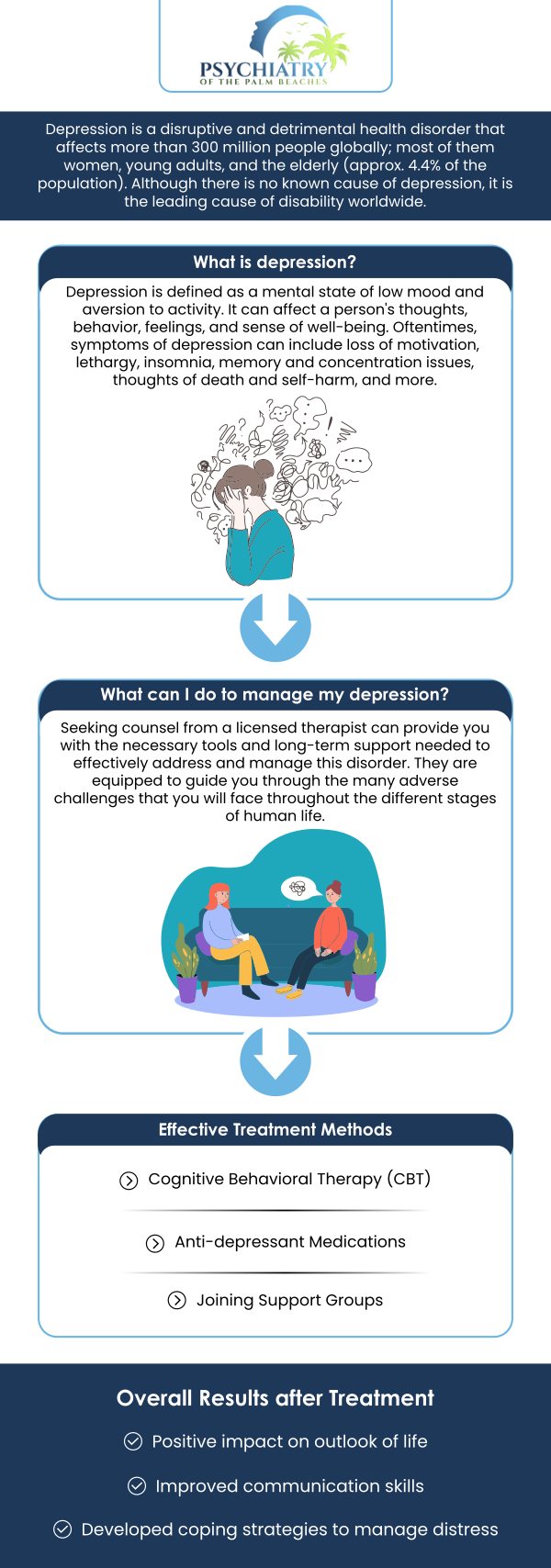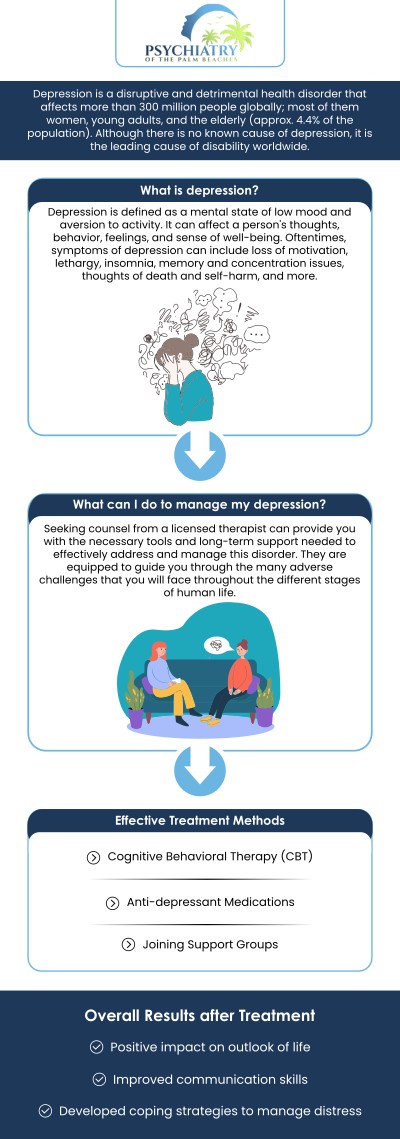Depression Treatment Specialist in Fort Lauderdale, FL
If you’re struggling with depression, personalized treatment options are available to help you regain control. At Psychiatry of the Palm Beaches in Fort Lauderdale, FL, our team offers tailored therapies for lasting relief. We focus on your unique needs to help you achieve better mental well-being. For more information, contact us or schedule an appointment online. We have a convenient location to serve you at 3107 Stirling Road, Suite 107, Ft. Lauderdale, FL 33312.


Table of Contents:
How can a depression specialist help me?
What are the most effective depression treatments available?
What types of therapy are used in the treatment of depression?
Can a specialist help with treatment-resistant depression?
A depression specialist focuses on identifying the underlying factors contributing to a patient’s symptoms and developing a treatment plan that is tailored to their specific needs. An initial appointment with a depression specialist at Psychiatry of the Palm Beaches will typically begin with a comprehensive evaluation. This appointment may involve a combination of assessments surrounding mood patterns, sleep disturbances, energy levels, and any coexisting mental health concerns.
By determining the severity and nature of the depression, the specialist can recommend appropriate customized interventions, whether through medication, therapy, or a combination of both. By developing an understanding of each patient’s unique condition effective treatment can be implemented and monitored.
Depression is a condition that varies from person to person, and an effective treatment approach often requires modifications over time according to patient response. Specialists are able to help stabilize symptoms while providing long-term strategies for managing depressive episodes, improving resilience, and addressing any underlying biological or environmental factors that may be contributing to the condition.
Effective depression treatment depends on the individual, but a combination of medication and therapy is often the most beneficial approach. Antidepressants, such as SSRIs, SNRIs, and other mood-regulating medications, help balance brain chemistry and alleviate symptoms. For some, a single medication may be sufficient, while others may require dosage adjustments or a combination of medications to achieve meaningful improvement. In addition to the use of medication, various therapies can address negative thought patterns, behavioral changes, and emotional regulation.
Cognitive-behavioral therapy (CBT), psychodynamic therapy, and interpersonal therapy are commonly used to help patients develop healthier coping mechanisms. A combination approach utilizing therapy and medication is often the most effective treatment as the medications and therapies positively influence the effectiveness of one another. In certain cases, alternative treatments like Spravato or transcranial magnetic stimulation (TMS) may be considered when standard approaches do not provide sufficient relief.
Different forms of therapy can be effective in treating depression, depending on the individual’s symptoms and personal history. Cognitive-behavioral therapy (CBT) is one of the most commonly used approaches, focusing on identifying and altering negative thought patterns that contribute to depressive symptoms. By addressing distorted perceptions and replacing them with healthier ways of thinking, patients can develop more effective coping strategies and reduce the impact of depressive episodes, ultimately improving their mental health and quality of life.
Other therapeutic approaches, such as psychodynamic therapy, may be required in order to explore deeper emotional conflicts and past experiences that may be influencing current mood disturbances. Interpersonal therapy (IPT) focuses on relationship dynamics and social stressors that contribute to depression, helping individuals improve communication and emotional regulation. Some may also benefit from dialectical behavior therapy (DBT) or mindfulness-based therapies, particularly when depression is accompanied by heightened emotional reactivity or difficulty managing distress.
For individuals who are struggling with treatment-resistant depression, a specialist provides access to alternative treatment options beyond standard antidepressants and therapy. When traditional medications fail to produce meaningful improvement, adjustments in medication type, dosage, or combination therapy may be necessary. In cases where conventional treatments are ineffective, interventions like ketamine-based therapies, transcranial magnetic stimulation (TMS), or electroconvulsive therapy (ECT) may be considered in order to target the symptoms of treatment-resistant symptoms.
Ongoing assessment is once again imperative in determining why a patient’s depression has not responded to initial treatments. A specialist evaluates factors such as coexisting conditions, underlying medical issues, or external stressors that may be contributing to persistent symptoms. By taking a personalized approach, treatment-resistant depression can be addressed through a combination of advanced therapeutic techniques and continuous monitoring to improve long-term outcomes.
Depression treatment specialists are available at Psychiatry of the Palm Beaches. For more information, contact us or schedule an appointment online. We have a convenient location to serve you at 3107 Stirling Road, Suite 107, Ft. Lauderdale, FL 33312. We serve patients from Ft. Lauderdale FL, Hollywood FL, Oakridge FL, Dania Beach FL, Lauderhill FL, and surrounding areas.


Additional Services You May Need
▸ Mental Wellness
▸ Relationship Coaching
▸ Depression and Mood Disorders
▸ Women’s Health
▸ Panic Disorder
▸ Medications Management
▸ Men’s Health
▸ Individual Psychotherapy
▸ Bipolar
▸ ADHD
▸ Geriatric Mental Health
▸ Life Coaching
▸ Couple’s Counseling
▸ Obsessive Compulsive Disorder
▸ Social Phobia Treatment
▸ Eating Disorders
▸ Post Traumatic Stress Disorder
▸ Psychotic Disorders


